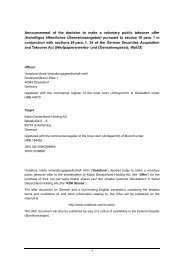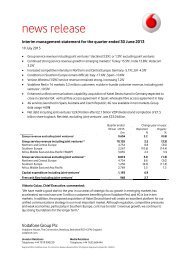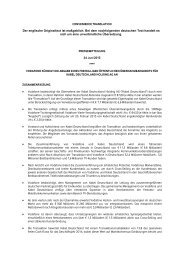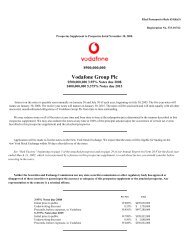You also want an ePaper? Increase the reach of your titles
YUMPU automatically turns print PDFs into web optimized ePapers that Google loves.
Moving the debate forward • The Policy Paper Series • Number 8 • April 2008<br />
Richard Feasey<br />
Introduction<br />
On-net call discounts, which allow customers to pay less<br />
for calls which remain within their own home network, have<br />
been a feature of telecommunications markets for many<br />
years. But they have recently begun to receive attention<br />
from regulators and anti-trust authorities as smaller<br />
operators claim that they are being used by large operators<br />
to restrict competition.<br />
It might be thought that regulators would be more<br />
concerned if on-net discounts did not exist. Cheaper on-net<br />
calls mean lower prices for customers who take advantage of<br />
them. In Europe’s calling party pays environment the marginal<br />
costs of making calls to other networks are higher than<br />
those of making calls on-net. The fact that these differences<br />
are reflected in retail prices would tend to suggest that<br />
competition is working, rather than suggesting the opposite.<br />
As Jonathan Sandbach shows in his paper, on-net discounts<br />
have been part of an increasingly competitive European<br />
market, and have not prevented new entrants from gaining<br />
market share.<br />
It is also possible that customers are more sensitive to the<br />
price of calls between users who benefit by being on the<br />
same network (e.g. friends and family) or that customers value<br />
receiving calls as well as making them (in which case on-net<br />
tariffs allow these benefits to be kept within the same network<br />
rather than shared with other networks). It is pretty clear that<br />
most customers have both characteristics to a greater or<br />
lesser degree. This suggests that on-net discounts will make<br />
sense, and are likely to be more efficient, even in the absence<br />
of a calling party pays termination rate environment. This may<br />
be why we observe differentials in the United States, despite<br />
much smaller differences in the costs of making on-net and<br />
off-net calls in that market. Nor is it clear that networks have<br />
Public Policy Director,<br />
<strong>Vodafone</strong> Group<br />
On-net Pricing in Mobile<br />
Richard is the Public Policy Director for the <strong>Vodafone</strong> Group, coordinating global public policy and<br />
regulatory affairs throughout <strong>Vodafone</strong>’s operating companies including Europe, the Americas, and<br />
the Asia-Pacific. Richard has over fifteen years experience in international telecommunications in fixed,<br />
internet and wireless sectors; having been responsible for public policy at MCI Worldcom International,<br />
Ionica plc and TeleWest Communications plc. He has chaired worldwide industry bodies and is currently<br />
chair of the Regulatory Advisory Board of the GSM Association.<br />
to be large to benefit from these effects. Frequent calling<br />
circles can be small, and consumers can gravitate to the<br />
same network regardless of its size.<br />
Some firms and regulators take a different view. They argue<br />
that on-net price discounts are best understood as a form of<br />
predatory pricing by larger networks, raising concerns that<br />
they will eventually ‘tip’ customers onto a single network.<br />
These fears echo concerns about ‘snowballing’, ‘tipping’<br />
and other network effects which have featured in many<br />
discussions about the internet, normally in relation to global<br />
backbones or search.<br />
These concerns appear to be growing as one important<br />
explanation for on-net discounts – the imposition by<br />
regulators of ‘asymmetric’ termination charges for calls to<br />
smaller networks – is being withdrawn in Europe. This has<br />
led some regulators and operators to argue that these<br />
higher termination rates should be retained in order to<br />
‘protect’ smaller operators from on-net price discounts.<br />
Other regulators and operators use the same reasoning to<br />
come to the opposite conclusion, suggesting that on-net<br />
pricing supports the case for much lower termination rates<br />
for all operators.<br />
Simple ex ante remedies like these are unlikely to be<br />
appropriate because the challenge for regulators and anti<br />
trust authorities here – as with most predation cases – is to<br />
distinguish between conduct which is efficient, benefits<br />
consumers and reflects competitive forces on the one<br />
hand; and conduct which leads to foreclosure on the other.<br />
Crude prohibitions fail to do this, resulting in more harm than<br />
good. The European Regulators Group wisely said in its May<br />
2006 version of its ‘remedies’ document that: ‘There is no<br />
1

















